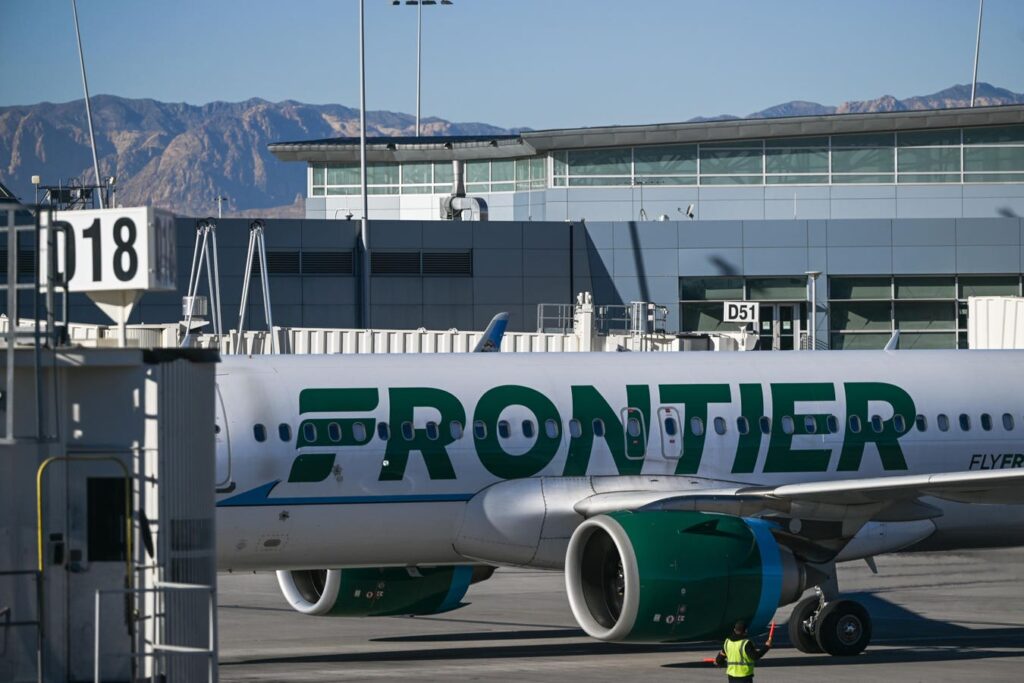A Frontier Airlines Airbus A320 sits at the gate at LAS. on January 10, 2025. (Photo by Artur Widak)
NurPhoto via Getty ImagesThe biggest surprise of the 2025 airline industry is that its top stock market performer comes from the low-cost segment , which some had thought was doomed.
Year-to-date through Friday’s stock market close, shares in Frontier Airlines were up 16%, ahead of the five remaining major U.S. airlines.
Time to play it safe? Not for Frontier, which said this month that it will try its luck on the nation’s most competitive route, JFK-LAX in May, as well as on two American Airlines JFK hub-to-hub routes in March and April.
The Frontier 2025 surprise story has its origins in a Jan. 6 SEC filing, when the carrier updated its guidance. “Revenue and cost initiatives continue to gain momentum alongside improving operational performance and customer experience, all of which is driving better than expected fourth quarter 2024 results and further confidence in the company’s target to return to double-digit adjusted pre-tax margins in the summer of 2025,” Frontier said then.
Between the market’s close on Jan. 3 and its close on Jan. 7, Frontier shares gained 17%.
As of Friday’s close, Frontier shares’ 16% year-to-date gain led industry star Delta shares, which were up14%. United was up 10 %, Alaska was up 8%, JetBlue was up 8%, American was flat and Southwest was down 4%.
Doubt about the low-cost carriers has been pervasive, although it has focused largely on Frontier’s only rival, Spirit, which filed for bankruptcy protection in November. Spirit has been delisted by the New York Stock Exchange and now trades as a penny stock.
In August, a Forbes story was entitled: “Airline Exec Says Someone Will Shut Down. It’s Not Frontier Airlines.” The story quoted Frontier CEO Barry Biffle, who said on the second quarter earnings call that “At the end of the day, when you’re under pressure, there are people who can sit back and let things happen or you can actively manage situation. We are the most actively engaged in addressing challenges and we meet them head on.
“We will be the clear low-cost winner in 2025 and beyond,” Biffle said then..
That call followed a period of mounting speculation about Spirit.
In June, speaking on The Air Show podcast, United CEO Scott Kirby said of the low-cost carriers, “I think they’re going out of business. It’s a fundamentally flawed business model. The customers hate it. The customers have voted, and they’re going out of business.” Also in June, Spirit CEO Ted Christie said the carrier was not considering a Chapter 11 filing.
During a CNBC interview in July, Delta CEO Ed Bastian said that demand is strong, “but the lower end is having a challenge.”
Kirby returned to the topic on United’s fourth quarter earnings call last week.
He said the age of growth for ultra-low-cost carriers has clearly ended. due to cost convergence. The cost of employees particularly pilots has risen, supply chain delays have tamped down capacity growth and the big carriers are smarter about pricing their lowest cost seats.
“At the same time, ULCC do have an advantage and will always be able to be more profitable than United in point-to-point, low-cost airports,” Kirby said.
However, he noted that rising airport costs have made it seemingly impossible for the ultra-low-cost carriers to function at some of the country’s most important airports, where long-needed massive construction projects have pushed costs up.
“Cost convergence has been the most impactful at the big, high-cost airports in the country,” Kirby said. “The cost per passenger in the three New York City airports is $48 compared to the average ULCC fare of $67 in those three airports. When an airline is spending 72% of their fare on airport costs, it’s hard for me to imagine that they could ever be profitable in those airports.”
It just seems that nothing will deter Biffle from trying a route.
This month, Frontier announced that it will launch service from JFK to Miami, Dallas and LAX. Miami, starting March 30, will be daily: Dallas, starting April 22, will be four times weekly: Los Angeles, starting May 1, will be daily. With the new routes, Frontier will serve eight destinations from JFK, where it already serves Atlanta, Las Vegas, Orlando, San Juan and Tampa.
From LGA, Frontier serves Atlanta, Cincinnati, Denver, Las Vegas and Orlando. From Newark, Frontier serves Atlanta and San Juan.
In a report issued Jan. 6th, after the SEC filing, Barclays analyst Brandon Oglenski write, “We see Frontier’s more optimistic outlook as continuing a favorable trend of improved industry unit pricing outcomes as the industry settles in to a lower growth environment.
Oglenski said Frontier actions “such as introducing bundled fare options, business fares, and the upcoming introduction of a first-class product should provide continued momentum.” With shares at $7.11,he maintained a price target of $10. Shares closed Friday at $8.42.
On Jan. 17, Bank of America analyst Andrew Didora raised his price estimate to $9 from $7.50, but noted that “We forecast just 6.2% pre-tax margin, which is below the double-digit rate the company has targeted since early last year.”
In 2024, United shares gained 135%; Alaska shares rose 66%; Delta rose 50%; JetBlue rose 42%; Frontier rose 30%; American rose 27% and Southwest rose 16%. The S&P 500 Index gained 23%.
Frontier will report earnings on Feb. 7. A lot of people are going to be listening.
Read the full article here


